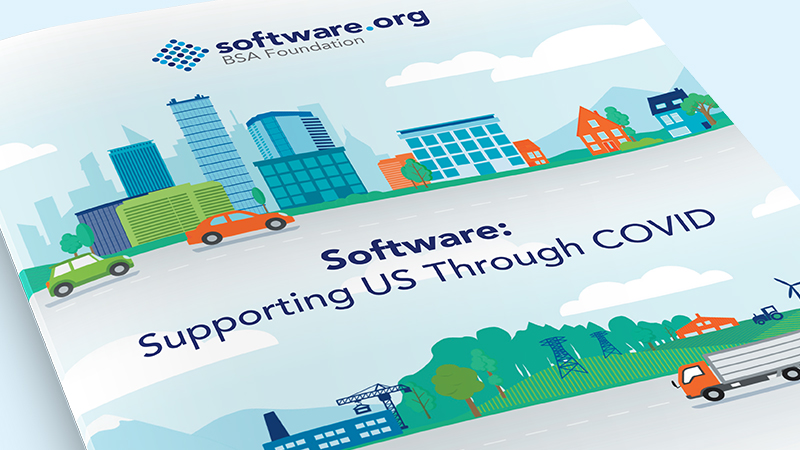June 03, 2025
Software.org: the BSA Foundation Hosts Bicameral Congressional Staff Delegation in New York City
May 04, 2021
The global COVID-19 pandemic changed the way we live, work, learn, and connect. Here at Software.org, as in other offices, we’ve moved to remote work and virtual events. And although the past year has been difficult, it’s also shown us the incredible impact of software and technology.
Our new report, “Software: Supporting US Through COVID,” with data and analysis from The Economist Intelligence Unit (EIU), demonstrates how software has helped businesses shift their models and promote public health during the pandemic. In an unprecedented period, the software industry supported more than 15.8 million total jobs – including 12.5 million jobs outside the tech sector. Software-powered collaboration tools made it possible for people to work and learn from home, and it helped organizations in every sector pivot quickly to meet the unique challenges of the pandemic.
These numbers show the overall impact of software – but they don’t fully capture the contributions of the tech industry during the pandemic. Shortly after the onset of COVID-19, software companies around the world sprang into action with hundreds of initiatives to support medical research, track the spread of the virus, and help organizations transition to safer ways of doing business.
Here are just a few ways that companies in every sector used software in 2020:
Software played an important role in helping Americans adjust to the new normal of COVID-19 – and the industry will also be essential to economic recovery in every state. The data from 2020 confirm something we’ve known for years: the economic impact of the software industry extends far beyond Silicon Valley. States like California, Washington, and New York continue to create thousands of tech jobs, and some unexpected states also popped up in this year’s data. New Mexico saw a 19 percent increase in direct software employment, while software jobs in Colorado and Florida grew by 10 percent.
There’s still work to do to ensure that everyone can benefit from the growth of the software industry. Software jobs are rapidly expanding, but there often aren’t enough workers to fill these open positions – and depending on where you live in the United States, it can be difficult to access the technology or training resources needed to learn software skills. That’s why we’re continuing our work with Transform Your Trade and Girls Who Code to help people take advantage of opportunities in software, regardless of their background.
Interested in learning more about software jobs from 2018-2020? Find our full report, “Software: Supporting US Through COVID,” here.

 Chris Hopfensperger
Chris Hopfensperger
Executive Director, Software.org
As the founding executive director of Software.org, Chris Hopfensperger leads the foundation’s efforts to help policymakers and the general public better understand the impact that software has on our lives, our economy, and our society. He also helps translate the foundation’s philanthropic and forward-looking agenda into efforts to address key issues facing the software industry.